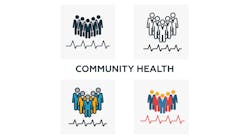During the pandemic many people have skipped preventive cancer screenings, which heightens the importance of identifying high-risk patients. Peoria, Ill.-based OSF HealthCare is expanding its cancer risk assessments to primary care and gastroenterology.
OSF Healthcare, which has 14 hospitals, many in rural areas, is using a platform from a company called CancerIQ combined with telehealth to expand access to cancer risk assessment and genetic testing/counseling, prioritize high-risk patients for screening, and provide personalized care management to stay ahead of this disease. Their goal is to identify cancer in its earliest, most treatable, stages.
Nationwide, breast cancer screenings dropped 94 percent at the beginning of the pandemic and many health systems are still playing catch up. Transitioning to virtual care helped OSF Healthcare conduct risk assessments and provide genetic testing and counseling to more patients, especially those living in rural areas.
Tenille Oderwald, supervisor of cancer services with OSF HealthCare, said they are now seeing some more complex cases with some advancements, because patients were delaying tests. “I think across the nation everyone is seeing that same trend,” she said.
CancerIQ offers an online, 5-minute survey that flags vulnerable patients based on a short personal and family history questionnaire. The application gives providers the information they need to quickly investigate the possibility of hereditary cancer for a patient.
OSF HealthCare has found that access to risk assessments and genetic testing and counseling has expanded when these services are offered virtually. It gives people the flexibility to complete assessments and testing at home. The health system says it also improves quality because people have more time to put thought into their responses and call family members to confirm information, leading to a more accurate picture of their risk. It also helps health systems facing a shortage of genetic counselors by enabling nurse practitioners to lead the process.
“We have nurse practitioners and physician’s assistants who have been trained in risk assessment and genetic counseling,” explained Michele Settelmyer, an advanced practice nurse in OSF HealthCare’s Saint Francis Medical Center in Peoria, “I remember there was a genetic counseling posting open for three years that was never filled. Our staff members are really proud that we've been able to make genetic experts and empower them with software that makes them just as qualified, if not more qualified, than our genetic counselors.”
Settelmyer added that “by using CancerIQ in primary care, we’re able to recognize which type of patients are coming into the office every day, and then Epic can send the front desk staff an alert of who is an appropriate patient to be screened by CancerIQ.”
The OSF HealthCare Centers for Breast Health in Peoria has been using CancerIQ for a little over four years, and primary care began rolling it out about five months ago with initial pilots in two clinics. OSF is in the process of setting up a program in GI clinics as well.
Settelmyer noted that transitioning to virtual care helped OSF HealthCare conduct risk assessments and provide genetic testing and counseling to more patients living in rural areas. Once patients are identified, the CancerIQ platform helps them manage long-term care and improve outcomes.
“The broader importance of doing risk assessment in a primary care setting is to make sure that the primary care providers are not delivering one-size-fits-all care,” said Feyi Olopade Ayodele, CancerIQ’s CEO. “If you're a high-risk patient, it means that you need to go through the genetic testing workflow. You may need something like a breast MRI in addition to a mammogram. So the standard communication that you should come in and get your mammogram every year is wrong in that scenario. But by contrast, sometimes if you find a patient that's at average risk, there's also an opportunity to offer cancer screening solutions that may be less invasive and more convenient for patients. So risk stratification in the primary care setting is important for care, not just for high-risk patients, but for average-risk patients so that you're offering what's appropriate.”
Ayodele explained that its platform is integrated with the EHR in some settings and not in others. In the primary care setting, it's important to have CancerIQ integrated into the EHR, because primary care physicians have a lot on their plate, she added. “The prospect of them leaving the EHR to pursue this separate workflow is less likely, she said. “For specialists like Michelle, or the specialists that we have in breast imaging, they're razor-focused on this specialty type of service, and therefore, they're more willing to focus on CancerIQ in a non-integrated fashion.”
Cancer risk screening fits in well with value-based care efforts. By taking a more risk-based or precision prevention approach, you can stratify patient populations and make sure that the best evidence-based care is getting to them and ultimately reduce disparities, noted Ayodele. “There are people who have underlying genetic risks that you can't see. To make sure that those patients are getting the right care and staying ahead of one of the most costly diseases out there, you need to make sure you know what their risk is and that the recommendation you're making to them is the right one.”
“I think the pilot in primary care has really helped us model the future of how we want to take care of these patients,” said Oderwald. “It has been very beneficial as the roadmap of the future. And for OSF, one of our big strategic goals is how do we prevent cancer from occurring? And this is definitely the very start of identifying those patients that are at high risk.”
Oderwald also described the importance of expanding to other specialties. “I have seen the change that happens when you're able to identify patients early and develop that risk stratification. Working as a breast health navigator for 17 years, I would sit across the table with a radiologist and tell them that they had a breast cancer diagnosis, and then hear that they had this huge family history. That was so disheartening to me. We need to be proactive; we can't be reactive. We have to be able to identify those patients and come up with a plan. And so that's where my passion really is. When I took this role — and I'm working with all different types of cancers now, I saw this opportunity — we can put this into a GI office and have the same exact model and really have those superior outcomes.”
The U.S. Preventive Services Task Force recently changed its recommendations for colonoscopies to age 45, and those guidelines are immediately updated in the CancerIQ platform.


